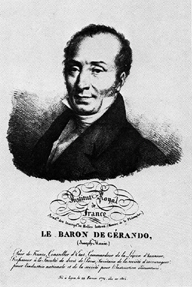Great Throughts Treasury
This site is dedicated to the memory of Dr. Alan William Smolowe who gave birth to the creation of this database.

Joseph Marie, baron de Gérando, born Joseph Marie Degérando, also Joseph-Marie de Gérando
French Philosopher, Linguist, Educator and Philanthropist
"Decency renders all things tolerable."
"Philosophers have very justly remarked that the only solid instruction is that which the pupil brings from his own depths; that the true instruction is not that which transmits notions wholly formed, but that which renders him capable of forming for himself good opinions. That which they have said in regard to the intellectual faculties applies equally to the moral faculties. There is for the soul a spontaneous culture, on which depends all the real progress in perfection."
"In the scenes of moral life the soul is at once actor and spectator."
"In an age of egoism, it is so difficult to persuade man that of all studies, the most important is that of himself. This is because egoism, like all passions, is blind. The attention of the egoist is directed to the immediate needs of which his senses give notice, and cannot be raised to those reflective needs that reason discloses to us; his aim is satisfaction, not perfection. He considers only his individual self; his species is nothing to him. Perhaps he fears that in penetrating the mysteries of his being he will ensure his own abasement, blush at his discoveries, and meet his conscience. True philosophy, always at one with moral science, tells a different tale. The source of useful illumination, we are told, is that of lasting content, is in ourselves. Our insight depends above all on the state of our faculties; but how can we bring our faculties to perfection if we do not know their nature and their laws! The elements of happiness are the moral sentiments; but how can we develop these sentiments without considering the principle of our affections, and the means of directing them? We become better by studying ourselves; the man who thoroughly knows himself is the wise man. Such reflection on the nature of his being brings a man to a better awareness of all the bonds that unite us to our fellows, to the re-discovery at the inner root of his existence of that identity of common life actuating us all, to feeling the full force of that fine maxim of the ancients: 'I am a man, and nothing human is alien to me."
"Philosophers have very justly remarked that the only solid instruction is that which the pupil brings from his own depths; that the true instruction is not that which transmits notions wholly formed, but that which renders him capable of forming for himself good opinions. That which they have said in regard to the intellectual faculties applies equally to the moral faculties. There is for the soul a spontaneous culture, on which depends all the real progress in perfection."
"The seal of suffering impressed upon our destiny announces in clear characters our high calling."